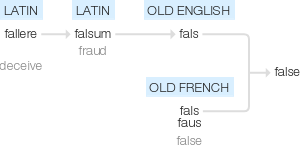False
Old English fals ‘fraud, deceit’, from Latin falsum ‘fraud’, neuter past participle of fallere ‘deceive’; reinforced or re-formed in Middle English from Old French fals, faus ‘false’.
wiktionary
From Middle English false, fals, from Old English fals(“false; counterfeit; fraudulent; wrong; mistaken”), from Latin falsus(“counterfeit, false; falsehood”), perfect passive participle of fallō(“deceive”). Reinforced in Middle English by Anglo-Norman and Old French fals, faus. Compare Scots fals, false, Saterland Frisian falsk, German falsch, Dutch vals, Swedish and Danish falsk; all from Latin falsus. Displaced native Middle English les, lese, from Old English lēas(“false”); See lease, leasing. Doublet of faux.
etymonline
false (adj.)
late Old English, "intentionally untrue, lying," of religion, "not of the true faith, not in accord with Christian doctrines," from Old French fals, faus "false, fake; incorrect, mistaken; treacherous, deceitful" (12c., Modern French faux), from Latin falsus "deceptive, feigned, deceitful, pretend," also "deceived, erroneous, mistaken," past participle of fallere "deceive, disappoint," which is of uncertain origin (see fail (v.)).
Adopted into other Germanic languages (cognates: German falsch, Dutch valsch, Old Frisian falsk, Danish falsk), though English is the only one in which the active sense of "deceitful" (a secondary sense in Latin) has predominated. From c. 1200 as "deceitful, disloyal, treacherous; not genuine;" from early 14c. as "contrary to fact or reason, erroneous, wrong." False alarm recorded from 1570s. False step (1700) translates French faux pas. To bear false witness is attested from mid-13c. False prophet "one who prophecies without divine commission or by evil spirits," is attested from late 13c.
